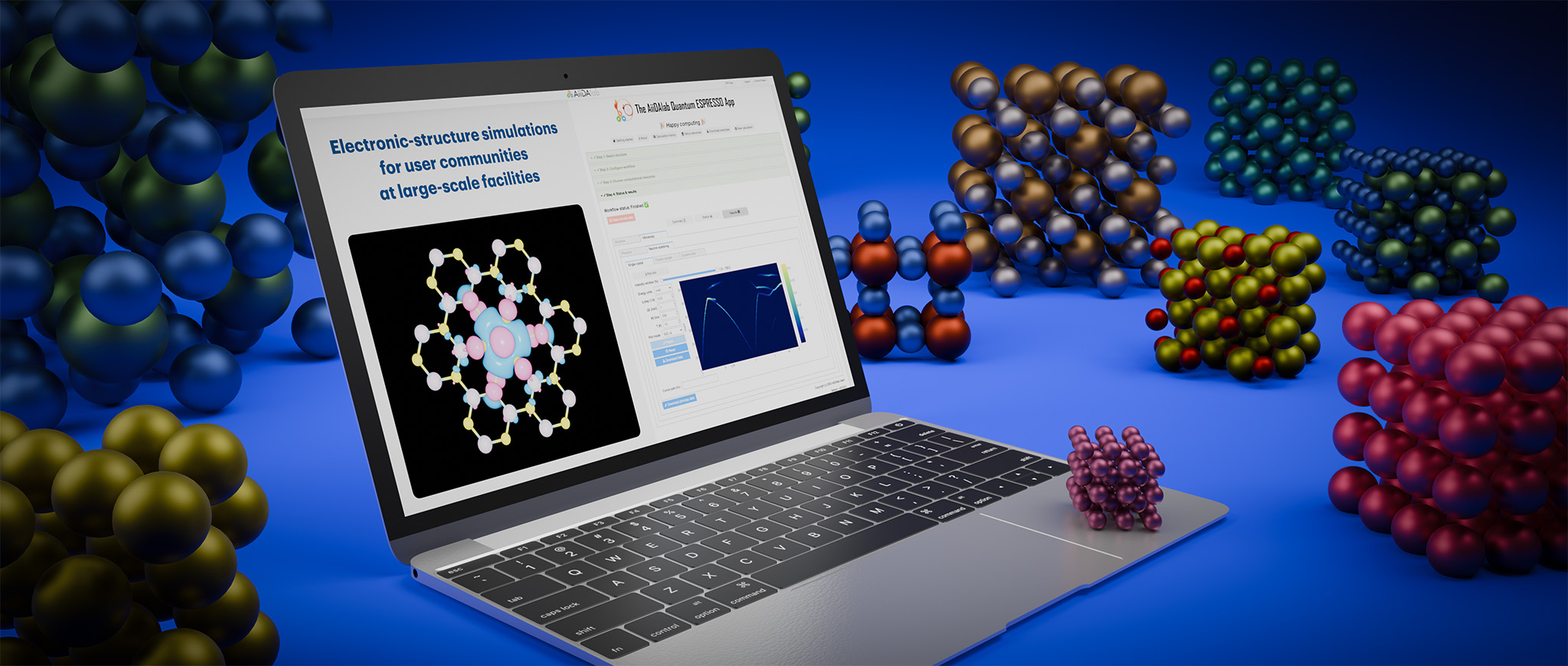Electronic-structure simulations for user communities at large-scale facilities
The Laboratory for Materials Simulations (LMS), part of the PSI Center for Scientific Computing, Theory, and Data (CSD), is organizing a 4-day focused course on: "Electronic-structure simulations for user communities at large-scale facilities".
The objective of the course is to provide a gentle introduction to the current capabilities in electronic-structure simulations for materials, having as key target audience experimentalists working at large-scale facilities.
The course will also discuss how to access these capabilities and run simulations through user-friendly web interfaces. All the software and infrastructure is open-source, is currently deployed at PSI, and can be redeployed freely anywhere else.
Course structure and timing
The course consists of four 2-hour modules:
- Fundamentals of electronic-structure theories: DFT and beyond (Thu, April 3 | 14:00-16:00 CEST | PSI Auditorium and streaming), Prof. Nicola Marzari (EPFL and PSI)
- Predicting materials properties with electronic-structure simulations (Fri, April 4 | 14:00-16:00 CEST | PSI Auditorium and streaming), Prof. Nicola Marzari (EPFL and PSI)
- Practical guide to DFT simulations, and hands-on session on-premises and in the cloud (Mon, April 7 | 14:00-16:00 CEST | PSI Auditorium and streaming), Dr. Giovanni Pizzi (PSI) and team
- Automated simulations for large-scale-facility applications (Wed, April 9 | 14:00-16:00 CEST | PSI Auditorium, and streaming), Dr. Giovanni Pizzi (PSI) and team
Streaming: The four modules were also be broadcast online in webinar mode. Recordings can be found below.
Coffee: Coffee will be served at 16:00 outside the PSI Auditorium, at the end of each module.
Additional support: Module 3 and 4 will be followed by an optional hour (16:00-17:00 CEST), for in-person participants, for additional direct support in running the simulations.
Course content
Modules 1 & 2 will provide an introduction to the fundamentals of electronic-structure methods, their current capabilities and limitations, highlighting which materials properties can be calculated, and with which accuracy. Suggested reading: N. Marzari, A. Ferretti, and C. Wolverton, Nature Materials 20, 736 (2021).
Modules 3 & 4, with support from Dr. Edan Bainglass, Dr. Miki Bonacci, Mr. Timo Reents, and Dr. Xing Wang (all from PSI LMS) and Dr. Andres Ortega-Guerrero (Empa) will be hands-on sessions where on-site participants will run simulations directly in the cloud via their browser using our AiiDAlab platform.
Participants will learn how to execute automated electronic-structure simulations, including:
- Crystal-structure relaxation with DFT
- Electronic properties: band structures, (projected) density of states
- Lattice dynamics & spectroscopy: phonons, infrared/Raman spectra, inelastic neutron scattering
- Muon spectroscopy: muon stopping sites (µSR)
Additional workflows will be discussed, including XPS, XAS, Bader charge analysis, Wannier functions (and derived properties such as Fermi surfaces, polarization, and electronic transport), and automated determination of U&V parameters for DFT+U(+V).
AiiDAlab local installation (in preparation of modules 3 and 4)
The two classes on April 7th and 9th (Module 3 and 4) will include hands-on tutorials with AiiDAlab, using Quantum ESPRESSO behind the scenes.
In-presence attendees will get access to a demo AiiDAlab server, active for the course duration. For those wanting to try the "AiiDAlab Quantum ESPRESSO" app on their own laptops, a local AiiDAlab version (with all required dependencies included) can be installed following the instructions in the AiiDAlab documentation page: https://aiidalab.readthedocs.io/en/latest/usage/access/local.html
Course material
All course material (videos and slides) are on Materials Cloud Learn in this section.
You can also access it below:
Module 1 - 3 April 2025: Video - Slides
(Nicola Marzari)
Module 2 - 4 April 2025: Video - Slides
(Nicola Marzari)
Module 3 - 7 April 2025: Video - Slides
(Giovanni Pizzi)
Module 4 - 9 April 2025: Video - Slides
(Timo Reents, Miki Bonacci, Andres Ortega-Guerrero, Xing Wang, Giovanni Pizzi)
Acknowledgements
We acknowledge the support of several institutions and projets in developing AiiDAlab and the related AiiDA workflows and apps. A full list of acknowledgments can be found here.
